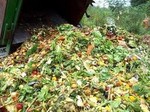
This is the view of Mike Barry, head of sustainable business at Marks & Spencer. He said only a step-by-step approach would work to increase the amount of food waste that is recycled in the UK.
As of May 2011, 47% of local authorities in the UK provided a food waste collection service to householders. At the Waste & Resources Action Programme's (WRAP's) annual conference in London last month, delegates debated how the number of collections and the volume of food waste that is recycled could be improved especially in high-density urban areas.
"When it comes to food waste, the big supermarkets, government, prisons, hospitals and schools have to take the lead and show that it can be done," said Barry. "Then it needs to be rolled out to certain council districts in less dense areas, then to high-density areas, which have lots of flats."
Smarter approach
Barry said a one-size fits all approach would not work and there needed to be a smarter approach in "picking areas to win".
Also, it was unacceptable for government and business to put the onus on homeowners, he said.
"Big business and government need to show they have broken the back of this before knocking on homeowners' doors," he said"Sequentially, big business needs to take a lead and provide inspiration."
Matthew Spencer, director of the environmental think tank the Green Alliance, said food recycling initiatives had "stalled" in some cases but predicted they would grow quite quickly in the coming years, with more councils collecting "smelly" waste weekly and dry waste fortnightly.
EU study
The EU is about to launch a study to discover how levels of food waste recycling in major cities can be increased.
Speaking at a food waste conference organised by the European Commission in November, Chantal Bruetschy, head of innovation and sustainability at the EU's directorate general for health and consumers, said it was a key area of focus.
"We will be looking at the role of cities and, in particular, issues such as logistics and transport to see what can be done," said Bruetschy."It is important that we understand what role these areas can play in tackling waste."





